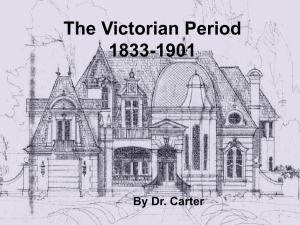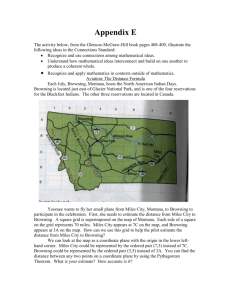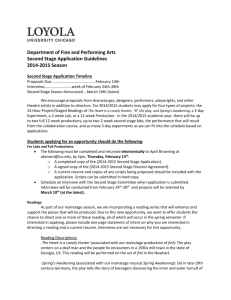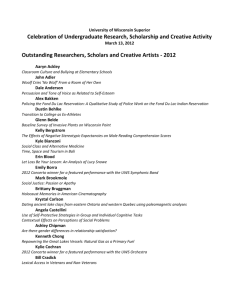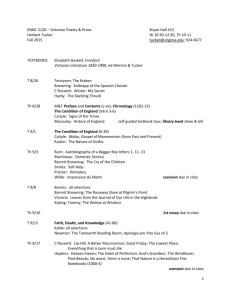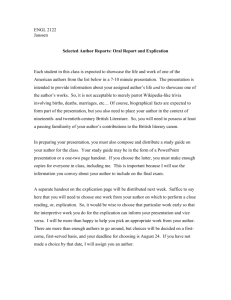0071Agamemnon_BrowningFuller Bert Fuller Dr. Roger Macfarlane
advertisement
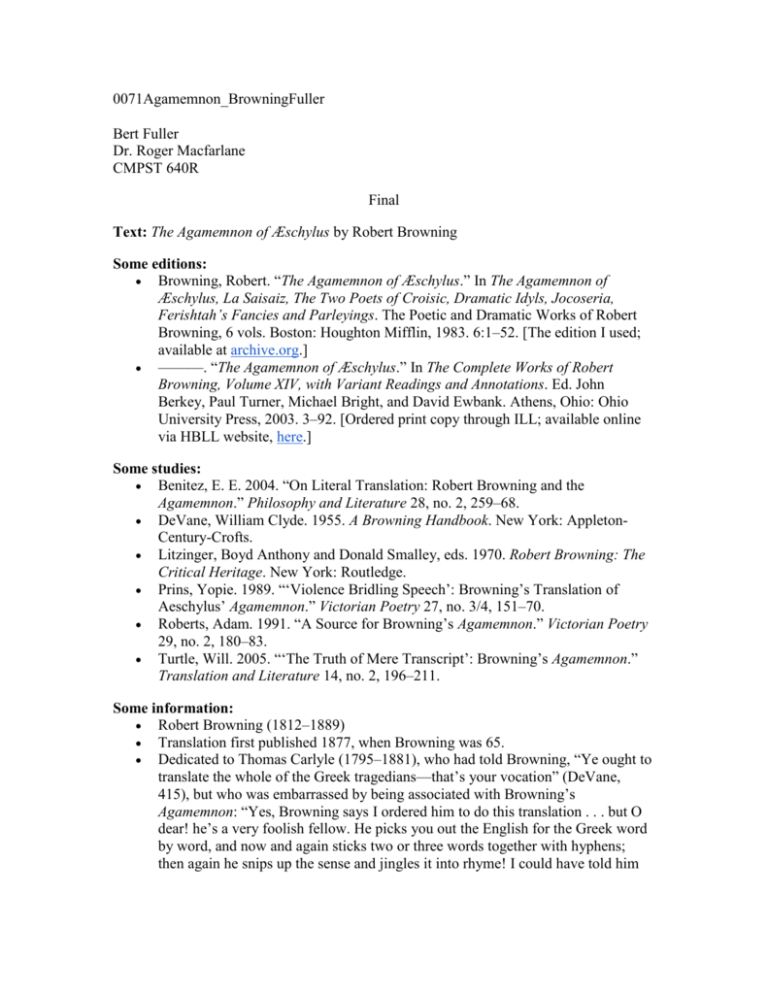
0071Agamemnon_BrowningFuller Bert Fuller Dr. Roger Macfarlane CMPST 640R Final Text: The Agamemnon of Æschylus by Robert Browning Some editions: Browning, Robert. “The Agamemnon of Æschylus.” In The Agamemnon of Æschylus, La Saisaiz, The Two Poets of Croisic, Dramatic Idyls, Jocoseria, Ferishtah’s Fancies and Parleyings. The Poetic and Dramatic Works of Robert Browning, 6 vols. Boston: Houghton Mifflin, 1983. 6:1–52. [The edition I used; available at archive.org.] ———. “The Agamemnon of Æschylus.” In The Complete Works of Robert Browning, Volume XIV, with Variant Readings and Annotations. Ed. John Berkey, Paul Turner, Michael Bright, and David Ewbank. Athens, Ohio: Ohio University Press, 2003. 3–92. [Ordered print copy through ILL; available online via HBLL website, here.] Some studies: Benitez, E. E. 2004. “On Literal Translation: Robert Browning and the Agamemnon.” Philosophy and Literature 28, no. 2, 259–68. DeVane, William Clyde. 1955. A Browning Handbook. New York: AppletonCentury-Crofts. Litzinger, Boyd Anthony and Donald Smalley, eds. 1970. Robert Browning: The Critical Heritage. New York: Routledge. Prins, Yopie. 1989. “‘Violence Bridling Speech’: Browning’s Translation of Aeschylus’ Agamemnon.” Victorian Poetry 27, no. 3/4, 151–70. Roberts, Adam. 1991. “A Source for Browning’s Agamemnon.” Victorian Poetry 29, no. 2, 180–83. Turtle, Will. 2005. “‘The Truth of Mere Transcript’: Browning’s Agamemnon.” Translation and Literature 14, no. 2, 196–211. Some information: Robert Browning (1812–1889) Translation first published 1877, when Browning was 65. Dedicated to Thomas Carlyle (1795–1881), who had told Browning, “Ye ought to translate the whole of the Greek tragedians—that’s your vocation” (DeVane, 415), but who was embarrassed by being associated with Browning’s Agamemnon: “Yes, Browning says I ordered him to do this translation . . . but O dear! he’s a very foolish fellow. He picks you out the English for the Greek word by word, and now and again sticks two or three words together with hyphens; then again he snips up the sense and jingles it into rhyme! I could have told him he could do no good whatever under such conditions” (Litzinger and Smalley, 432–33). Contains a 3-page preface outlining Browning’s translation strategy. Browning translated F. A. Paley’s 1870 Agamemnon. 1734 lines. Some observations: I wanted to read this poem for several reasons; I mention two. First, I thought The Browning Version was an excellent film and wanted to be better acquainted with its source material. Second, Robert Browning is a towering figure in modern English poetry, and I remain almost completely ignorant of his work. When I opened the text, I was almost instantly disappointed: “The gods I ask deliverance from these labors, / Watch of a year’s length whereby, slumbering through it / On the Atreidai’s roofs on elbow,—dog-like—” (ll. 1–3); or Choros. Boast on, bearing thee audacious, like a cock his females by! Klutaimnestra. Have not thou respect for these same idle yelpings! I and thou Will arrange it, ruling o’er this household excellently well. (ll. 1731– 34) Any sors Browningilis in this text will present the reader with a passage equally baffling. I could have chosen my examples at random, but the choice of first and last should give the impression for the whole way through. Browning claims in the preface “I should require [a translator] to be literal at every cost save that of absolute violence to our language.” He must have been aware that in his translation Browning erred on the side of liberal violence. You can imagine my relief when other critics reacted similarly, not just Carlyle. Swinburne: “beyond belief—or caricature”; and Pound: “a stilted unsayable jargon” (see Prins, 169). Sir Fredric Kenyon: “[a] perverse tour de fource”; and William Devane: “[a] strange perversity” (see DeVane, 414–19). Nevertheless, Yopie Prins says it best: “But perhaps this perversity is worth exploring in detail,” which she does brilliantly with the help of George Steiner and Walter Benjamin (151). (Prins herself is a brilliant polyglot Victorianist with degrees in Greek, comparative literature, English, and translation studies.) Browning’s reception of Aeschylus is stunning precisely because (quoting Prins again) “Browning’s refusal to suppress the ambiguities of such a text (‘what seems to lie in it’) is significant. Reading is meant to be hard work: rather than exercising the scholar’s ‘privilege’ [i.e., private reading, or law unto one] of ‘clearing the way’ for meaning, Browning’s task as translator is to preserve ‘each obstacle’ in the original text . . . Browning aspires to a ‘poetry of obstacles’” (158). He chooses the path of most resistance. In conclusion, Browning’s narrative gain is the fact that he exerts great effort to keep the text obscure. As one Oxford B.A. supposedly said, “At almost every page I had to turn to the Greek to see what the English meant” ((Litzinger and Smalley, 443). He does so to remind readers (should there be any) that the Greek is distant from us. The English, where it should familiarize, has an estranging effect. To be frank, it makes me very uncomfortable, which is why I will return to it in the future.
